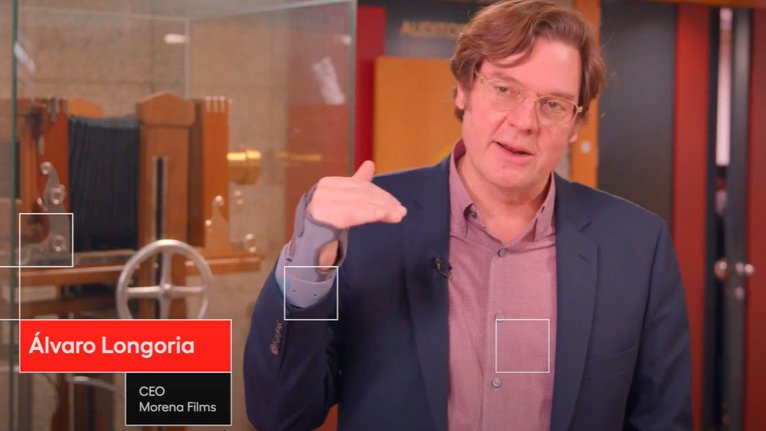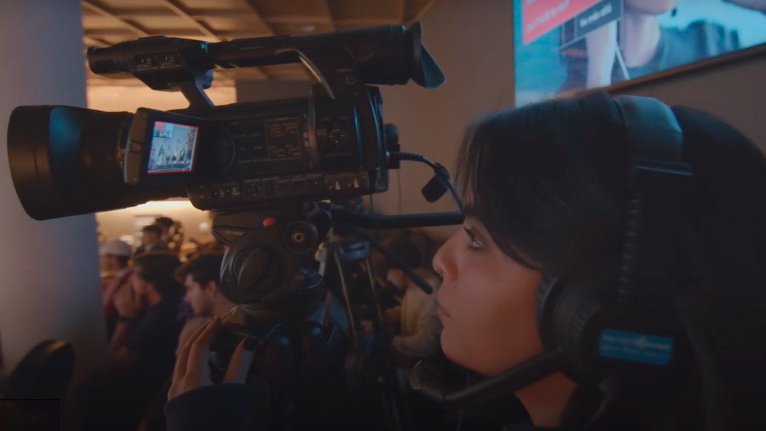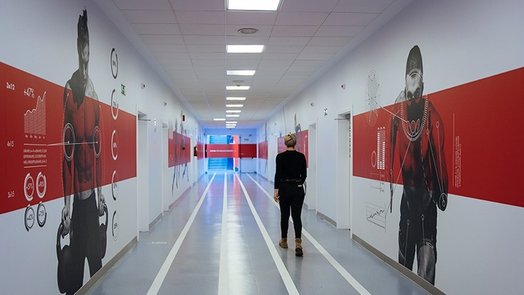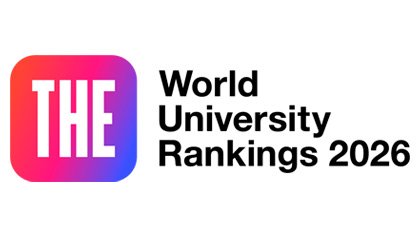-50% Discount on place reservation for 26/27 intake until February 28th!
Degree in Media Studies
The Bachelor’s Degree in Media Studies is an official degree that aims to train future professionals to work on diverse audiovisual products on any platform and in any medium: cinema, television, radio, video games or the Internet. To benefit from a professional career in the audiovisual communication sector, it’s essential to have the knowledge and know how to use the latest technology and innovation. For this reason, the curriculum includes differential subjects such as motion graphics, infographics and data processing, transmedia narrative, app design, gamification, and entertainment formats.
Official degree issued by Universidad Europea de Madrid
| Campus-based | Villaviciosa de Odón | 4 Years, 240 ECTS | Start: 14 sep. 2026 | Faculty of Economics, Business and Communication Sciences |
Communication and Marketing facilities
Study plan
A different curriculum
Study differential subjects such as motion graphics, infographics and data processing, transmedia narrative, app design, gamification, and entertainment formats, and specialise in fiction, new media or broadcasting, designed to respond to new challenges.
Study plan structure
Programa de estudios
PRIMER CURSO
| Materia | ECTS | Tipo | Idioma de impartición |
|---|---|---|---|
| Personal and professional effectiveness | 6 | COMPULSORY | English (en) |
| History of cinema | 6 | CORE | English (en) |
| Communication theory | 6 | CORE | English (en) |
| Contemporary world history | 6 | COMPULSORY | English (en) |
| Fiction scriptwriting I | 6 | COMPULSORY | English (en) |
| Introduction to photography | 6 | CORE | English (en) |
| Audiovisual narrative | 6 | CORE | English (en) |
| Audiovisual technology | 6 | CORE | English (en) |
| Sound | 6 | COMPULSORY | English (en) |
| Aesthetics | 3 | CORE | English (en) |
| Introduction to graphic design | 3 | CORE | English (en) |
SEGUNDO CURSO
| Materia | ECTS | Tipo | Idioma de impartición |
|---|---|---|---|
| Foundations of animation and video games | 6 | COMPULSORY | English (en) |
| Personal influence and impact | 6 | COMPULSORY | English (en) |
| Specialised legislation | 3 | COMPULSORY | English (en) |
| Cinematographic analysis | 6 | COMPULSORY | English (en) |
| History of the media | 6 | CORE | English (en) |
| Documentary workshop | 3 | COMPULSORY | English (en) |
| Radio production and broadcasting | 6 | CORE | English (en) |
| Communication groups and media companies | 6 | CORE | English (en) |
| Editing I | 6 | COMPULSORY | English (en) |
| Photography and lighting direction | 6 | COMPULSORY | English (en) |
| Audiovisual production | 6 | CORE | English (en) |
TERCER CURSO
| Materia | ECTS | Tipo | Idioma de impartición |
|---|---|---|---|
| Social research methodologies | 3 | COMPULSORY | English (en) |
| Music for audiovisuals | 3 | COMPULSORY | English (en) |
| Video post-production | 6 | COMPULSORY | English (en) |
| Sound design | 6 | COMPULSORY | English (en) |
| Editing II | 6 | COMPULSORY | English (en) |
| Media marketing and distribution | 6 | COMPULSORY | English (en) |
| Specialist photography | 6 | COMPULSORY | English (en) |
| TV production | 6 | COMPULSORY | English (en) |
| Film direction | 6 | COMPULSORY | English (en) |
| Special effects | 6 | OPTIONAL | English (en) |
| Directing actors | 6 | OPTIONAL | English (en) |
| Infographics and data processing | 6 | OPTIONAL | English (en) |
| Gamification | 6 | OPTIONAL | English (en) |
| Entertainment formats | 6 | OPTIONAL | English (en) |
| Advanced Audiovisual technology | 6 | OPTIONAL | English (en) |
CUARTO CURSO
| Materia | ECTS | Tipo | Idioma de impartición |
|---|---|---|---|
| Graduation Project | 9 | COMPULSORY | English (en) |
| Entrepreneurial leadership | 6 | COMPULSORY | English (en) |
| Audiovisual English | 6 | COMPULSORY | English (en) |
| 3D animation | 6 | COMPULSORY | English (en) |
| Audiovisual integration workshop | 3 | COMPULSORY | English (en) |
| Academic internships | 6 | COMPULSORY | English (en) |
| Voice-over and dubbing | 3 | COMPULSORY | English (en) |
| Motion graphics | 3 | COMPULSORY | English (en) |
| Short film workshop | 6 | OPTIONAL | English (en) |
| Series workshop | 6 | OPTIONAL | English (en) |
| Fiction scriptwriting II | 6 | OPTIONAL | English (en) |
| Branded content | 6 | OPTIONAL | English (en) |
| App design | 6 | OPTIONAL | English (en) |
| Transmedia narrative | 6 | OPTIONAL | English (en) |
| Multi-platform audiovisual production | 6 | OPTIONAL | English (en) |
| New trends in television | 6 | OPTIONAL | English (en) |
| Broadcasting events on television | 6 | OPTIONAL | English (en) |
Number of places for incoming students
40 places in the english modality.
Internships
In-company internships are a key part of your training. Gaining experience based on what you have learnt in your degree is the best way to enter the job market. There are two types of internships: curricular (included in the curriculum) and extracurricular (those that you can choose to do on a voluntary basis).
In order to do an in-company one, you’ll need to have obtained 50% of the credits and to enrol in the subject before starting your internship. These internships are monitored by the company and the internship professor, and also involve interim and final assessment reports.
If you would like to improve your work experience before finishing your university studies, you can do an extracurricular internship. You can do one in any academic year, but we would remind you that internships are a training complement to your studies. Therefore, the more knowledge you’ve already acquired over the course of your programme, the more you’ll benefit from the internship experience.
During the final year, you’ll do an internship at a key institution, research centre or company in the biotechnology sector at national and international level, which will allow you to put into practice all the knowledge you have acquired. These include:
- ASEBIO associated companies
- National Centre for Biotechnology (CNB)
- Spanish National Research Council (CSIC)
- Carlos III Institute of Health (ISCIII)
- The Foundation for Biomedical Research at the Gregorio Marañón Hospital, the Foundation for Biomedical Research at the Getafe University Hospital and the Toledo Paraplegic Hospital.
- And in biotechnology and pharmaceutical companies such as Genómica, ERCROS, Lilly, BMS, Quintiles, IVI, Cofares, Febiotec, Bioenergía y Desarrollo Tecnológico, Biotools, Carestream Health Spain, Federación Española de Centros Tecnológicos, IMERETI, Genómica S.A.U., Pharmamar, 3P Biopharmaceuticals, Gamesa Innovation & Technology, General Electric International INC, Jansen Cilag SA, Kantar Health SA, KOM Pharmatec Labs, LABCO Pathology SLU, Laboratorios Alcalá Farma, Laboratorios Medicamentos Internacionales SA, Lilly, Lonza Biologicals Porriño, Medtronic Iberica, Merk Sharp Dohme España, Mönlycke Health Care, Praxis Biopahrma Research Institute, Proteus Research, Roche Pharma, Sanitas SA de Hospitales, Siemens, Star Petroleum SA, Unidad de Reproducción SA, Veolia Water System Iberica and Wyeth Pharma.
- Madrid Science Park, Inkemia
Click here for more information on the internships offered at key institutions, research centres and companies in the biotechnology sector at national and international level.
Employability
Professional Opportunities Offered by the Bachelor’s Degree in Media Studies
With the Bachelor’s Degree in Media Studies, you’ll learn to communicate creatively using the most modern communication channels and techniques. At the end of your studies you’ll be able to create diverse audiovisual products for cinema, television, radio, video games and the Internet. All this implies a specific code and language that you’ll learn over the course of your studies that will enable you to work in public or private companies that sell this type of content.
Of course, it is natural for you to ask yourself what professional opportunities in audiovisual communication might be open to you, since the ultimate aim of everybody who studies for a university degree is to build a career. In this case, audiovisual communication has a major advantage: the technological advances that the world of media is currently benefiting from.
Career Opportunities
Communication groups
- Audiovisual director.
- Audiovisual producer.
- Audiovisual manager (content, programming).
- Filmmaker.
- Social manager.
- Content manager.
- 3D designer and animator.
- Graphic designer
- Digital image editor.
Cinema
- Producer.
- Filmmaker.
- Director of photography.
- 3D designer and animator.
- Editor.
- Post producer.
- Sound designer.
Environmental
- Programmes for the development of products or services that are of environmental benefit.
- Natural resource protection programmes (biosafety and bioremediation).
- Design of environmental decontamination strategies using biotechnological methods.
- Biological pest control, and biofertiliser and biopesticide production and development programmes.
New profiles
- Video 360.
- Immersive TV.
- Video marketing.
- Transmedia content.
Research and teaching
- Researcher, teacher and expert in higher audiovisual studies.
- Teacher of communication and new technologies in vocational training and secondary education, in both the public and the private sectors.
Admissions
Start your future at Universidad Europea
You can become a student at Universidad Europea in three easy steps.
1
Admission exams
Start your admission process by calling +34 918257503 or request information and our advisors will contact you.
2
Place reservation
Once you have been admitted, secure your place by paying the reservation fee.
3
Enrollment
Submit the required documents to formalise your enrollment.
Scholarships and financial aid
We want to help you. If you want to study at Universidad Europea, you will have at your disposal a wide selection of own and official scholarships.
Credit recognition and transfers
You don’t have to stick with something you don’t like. That’s why we’ve designed specific plans for credit recognition and transfers.
Request your online credit recognition review, transfer your academic file and start studying at Universidad Europea.
Profile for students and admissions requirements
In the case of students who apply for the degree in English, they will be able to accredit a B1 level of the Common European Framework of Reference for Languages of the European Higher Education Area with a recognized diploma or certificate or, alternatively, they can do so through a test designed by the university itself.
Open Days
We know that now is an important moment to progress in your professional future. That is why we open our virtual doors to you and invite you to join us. We want you to meet the director of your programme and solve all possible doubts you have. You’ll also discover what makes our students and our online methodology unique.
14 February
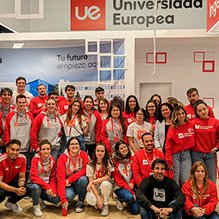
Come and see the campus
Get to know the facilities and discover why Universidad Europea is made for you.
Faculty
Our teaching staff
- Rubén Carbayo Jiménez
Specialist in Marketing and Consumer Neuroscience, fields in which he is currently developing scientific research projects. He has received multiple awards and recognitions for excellence in his academic career.
Entrepreneur. With extensive experience as a management director, commercial intermediary and marketing consultant in the raw materials markets, where he works with more than 40 clients at both national and international levels. - Marcos González
He is a professional with extensive experience in corporate communication, marketing, and new technologies, specializing in the integration of communication strategies to achieve organizational objectives.
He is currently a professor of Marketing, Audiovisual Communication, Advertising, and Journalism at Universidad Europea de Madrid.
He has experience in art direction and motion graphics, having previously worked as Head of Audiovisual Services at the General Council of Nursing of Spain, as well as in roles such as analyst, audiovisual technician, and production director in various companies.
In 2024, he received the prestigious Silver Pentawards for the student brief design for Carrefour. He holds advanced training in communication and audiovisual management, with strong skills in design and creative software such as Photoshop, After Effects, and Cinema4D, along with fluent proficiency in English as a second native language. - Victor Sánchez Franco
PhD in Journalism by the Complutense University of Madrid.
Experience in press and online sports marketing, as well as community manager positions in digital media and advertising. Experience as an external lecturer in web editing and positioning sessions in the Master's program in Marketing from EAE Business School. Currently, developing academic research related to immersive journalism and digital media. - Maria J. Revalderia
More than 25 years of experience in written and audiovisual media. Responsible for the launch of thematic TV channels in Spain, US and Latam. Responsible for the launch of FlixOlé, the largest OTT of Spanish films. Currently responsible for the development and expansion of EGEDA's digital commercial activity with projects such as platinocrowfunding.com and platinoempleo.com. Coordinator of Iberseries Platino Industria Market. Associate Professor and independent Producer. Has attended major films festivals and markets, including Cannes, AFM, Berlin, Buenos Aires, Sundance, and more. She has also acted as a judge for several film festivals and has been a guest speaker and panelist. Maria continues to represent film investors and filmmakers, working with them to obtain strong content according to the current market, She is a member of the Film Academy of Spain.
Excellence endorsed by the best
Frequently Asked Questions
What can I do with Media Studies?
Media Studies is an interdisciplinary field that examines the creation, consumption, and impact of various forms of media, including television, film, music, social media, and video games. Studying media can provide a range of skills and opportunities that can lead to careers in different industries.
Here are some possible career paths for Media Studies graduates:
- Media Production
- Advertising and Marketing
- Journalism and Publishing
- Public Relations
- Education
- Research and Analysis
Overall, Media Studies can be a versatile degree that can lead to a range of career paths. The skills you will develop in critical thinking, research, and communication can be applied to many different fields.
What do you study in a Media Studies degree?
As mentioned, a Degree in Media Studies is a programme that covers a wide range of subjects you have a knowledge of how different sectors work, including TV, radio, online, music, and video games.
At Universidad Europea, our programme is designed to give you as broad an education as possible. The study plan covers areas such as:
- Motion graphics,
- Infographics and data processing,
- Transmedia narrative,
- App design,
- Gamification.
How long does it take to study Media Studies?
A Degree in Media Studies normally takes around four years to complete. At Universidad Europea, our programme is made up for 240 ECTS, and the study plan covers a range of subjects covering all areas of interest. Throughout the degree, you will have the chance to complete internships and work placements at media organisations and other companies in the sector learning from experts and professionals.
You can also take part in study exchange programmes with our international partners, allowing to you network, and develop the communication skills necessary to success in the world of work no matter in which country or location you decide to launch your career.
Where can I study Media Studies?
Many universities offer the Degree in Media Studies, so there are lots of options. Universidad Europea is one of the leading private universities in Spain and is an excellent choice if you are looking to study Media Studies in English in Spain.
Our faculty is made up of leading experts in their field, many of whom are still working in their professions today, meaning you will get the very latest updates on the media sector.
The campus in Madrid also offers top level facilities in which to study, including:
- Digital sound / dubbing room
- Photography and digital imaging laboratory
- Radio
- Post-production booths
- Production room
- Photography set
- Virtual set
- Production control and TV set


